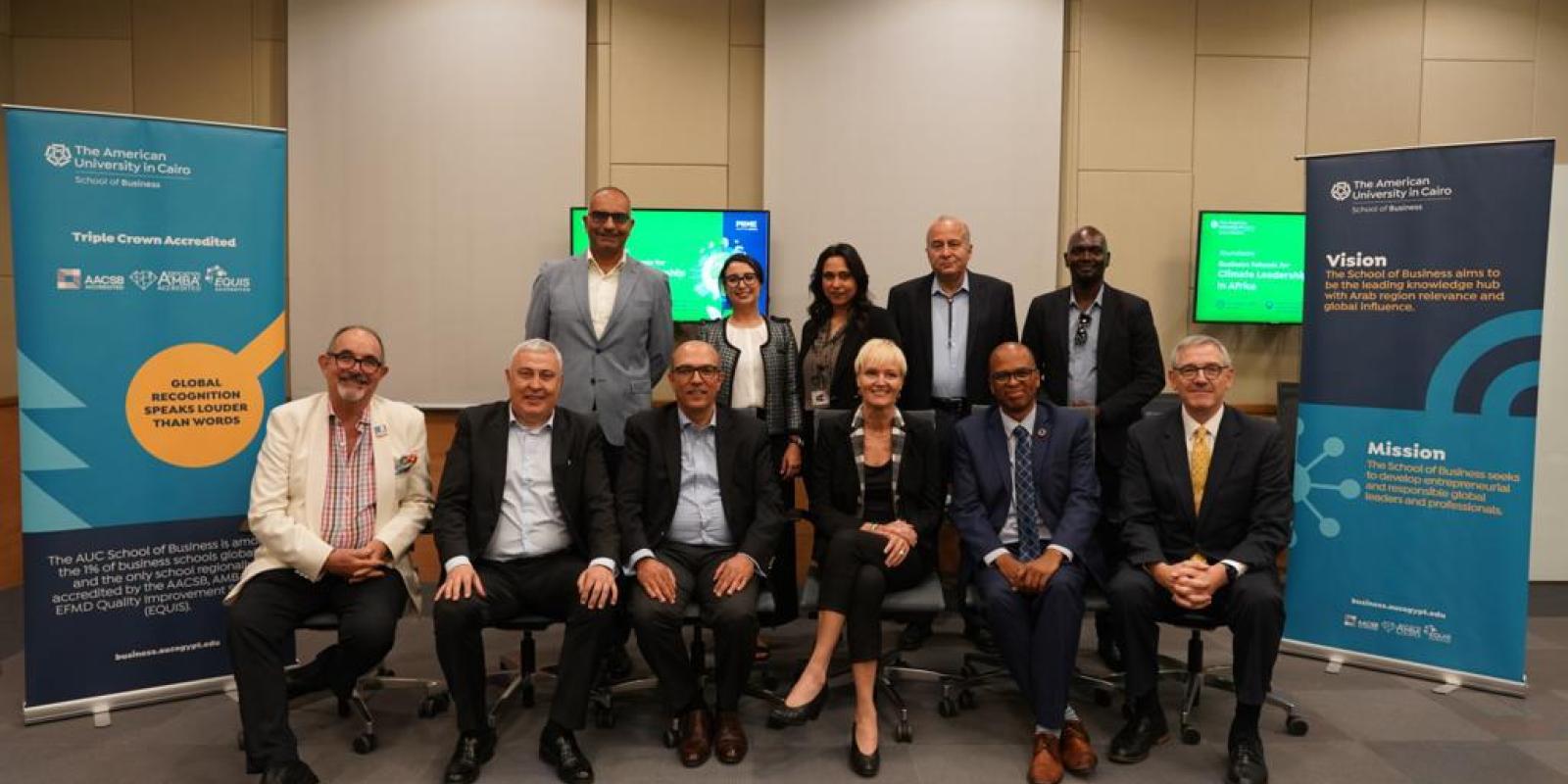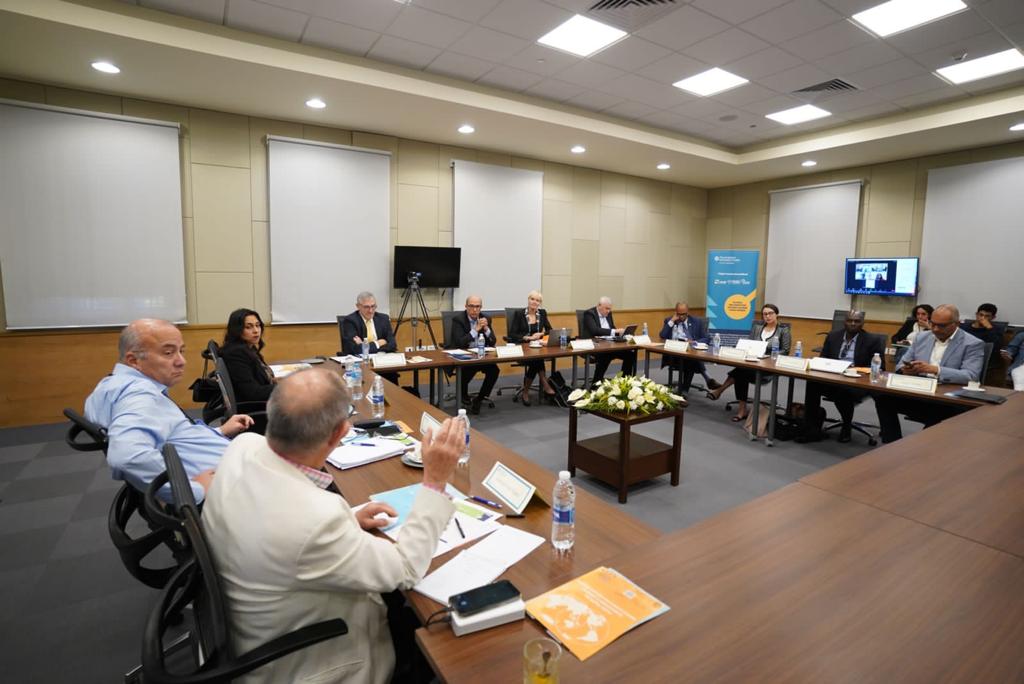
African business schools’ deans launch their climate leadership initiative at AUC School of Business
On November 7, AUC School of Business hosted a roundtable for deans of six leading African business schools as well as representatives from the African Chapter of the Principles for Responsible Management Education (PRME) and the European Business Schools for Climate Leadership (BS4CL), who gathered to launch of the Business Schools for Climate Leadership (BS4CL Africa) initiative.
BS4CL Africa brings together business schools to build a collaborative framework for climate action to transform business education curricula to match the needs and adapt to the realities of the African continent.
The initiative also invites contributions from the private sector and civil society and will mirror the ambitions of the UN Climate Conference (COP27) which took place in parallel in Sharm El-Sheikh, Egypt. BS4CL Africa is based on the model inspired by the BS4CL group, initiated by eight leading business schools in Europe at COP26 last year.
Peter Tufano, dean and professor emeritus, Saïd Business School at the University of Oxford, Baker Foundation professor at Harvard Business School and BS4CL founding member, shared his support of the Africa-centered edition of BS4CL
“I am thrilled to represent BS4CL at the launch of BS4CL Africa aligning with the opening of COP27. Business schools and businesses have much to contribute to battling climate change and its impacts, and BS4CL Africa will bring an authentic and important African perspective to this global and local issue.”
The roundtable was attended virtual and in-person by: Sherif Kamel, dean, AUC School of Business in Egypt, Thami Ghorfi, president, ESCA Ecole de Management in Morocco, Morris Mthombeni, dean, Gordon Institute of Business Science in South Africa, Yinka David-West, deputy dean, Lagos Business School in Nigeria, David Chiawo, dean, School of Tourism and Hospitality at Strathmore University in Kenya, Mark Smith, director, Stellenbosch Business School in South Africa, Jonathan Foster-Pedley, chair, Association of African Business Schools (AABS), Sarah El-Battouty, Global Ambassador for the United Nations Framework Convention on Climate Change (UNFCCC), Mette Morsing, head, Principles for Responsible Management Education (PRME) at UN Global Compact, Peter Tufano, dean and professor emeritus, Saïd Business School at the University of Oxford, Baker Foundation professor at Harvard Business School and BS4CL founding member, Andrew Jack, global education editor, The Financial Times, Sherwat Elwan Ibrahim, chair of PRME Chapter Africa, Mumbi Wachira, vice-chair, PRME Chapter Africa, Samer Atallah, associate professor of economics and associate dean for graduate studies and research, AUC School of Business in Egypt, Fadwa Chaker, director of research, ESCA Ecole de Management in Morocco, and Ali Awni, professor of practice and director at The John D. Gerhart Center for Philanthropy, Civic Engagement and Responsible Business at AUC School of Business in Egypt.

“BS4CL Africa exemplifies how African businesses are already taking responsibility for their impact on the planet and considering the planet’s impact on their businesses. PRME Chapter Africa continues to produce thought leadership in this area through its programs and network. After its launch one year ago during the AUC Business Forum, its membership has already grown to 20 schools out of the larger PRME network of over 860 higher education institutions. The BS4CL Africa initiative is sure to be one of high impact into the future”, commented Mette Morsing.
“We are excited about the momentum of BS4CL Africa and envision that the Deans Roundtable will be a continued collaboration for impact, one which closely aligns with the ambitions of PRME,” continued Sherwat Elwan Ibrahim.
The discussion focused on climate challenges and policies and the need to address them in business curricula through teaching, case studies and projects to help shape the next generation awareness and engagement in climate action.
Recognizing the critical role that higher education plays in addressing climate change and its associated challenges, Dean Sherif Kamel said
“Our ultimate goal is for business schools to effectively address climate change issues by integrating timely and critical subjects within the business schools’ ecosystem. This encompasses teaching, curriculum, cases, and projects including research endeavors and business development activities, as they help shape the next generation of leaders to impact society.”
The speakers tackled topics, such as the required resources for associated activities to increase awareness on climate leadership, including gathering Deans’ support, institutional commitment, dedicated faculty, and partnership champions.
“We are a bridge between the public and private sectors, and we need to use this to affect change in policies for the betterment of society,” stated Yinka David-West.
“It is our responsibility to be leaders of change in our societies,” echoed Thami Ghorfi.
The discussion candidly addressed issues and possible hindrances like resource limitations, prioritization conflicts, school competition, industry commitment, and being able to sell value to students as business schools. As a result, the initiative plans to develop a white paper for attainable action by business schools.
Check out more footage from the Deans Roundtable here.
